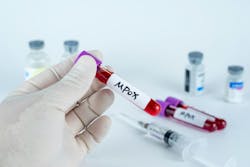WHO and partners establish an access and allocation mechanism for mpox vaccines, treatments, tests
In coordination with Member States, the World Health Organization (WHO) and partners have established an access and allocation mechanism for mpox medical countermeasures including vaccines, treatments and diagnostic tests.
The Access and Allocation Mechanism (AAM) will increase access to these tools for people at highest risk and ensure that the limited supplies are used effectively and equitably.
The AAM was established as a part of the interim Medical Countermeasures Network (i-MCM-Net). The i-MCM-Net brings together partners from around the world, including UN and other international agencies, health organizations, civil society organizations, industry and private sector to build an effective ecosystem for the development, manufacturing, allocation and delivery of medical countermeasures. The network was endorsed by WHO Member States as a mechanism to operate in the interim, as negotiations continue towards a pandemic agreement.
Along with WHO, the AAM for mpox includes members of the i-MCM-Net: the Africa Centres for Disease Control and Prevention, the Coalition for Epidemic Preparedness Innovations, the EU’s Health Emergency Preparedness and Response Authority, FIND, Gavi, the PAHO Revolving Fund, UNICEF, Unitaid and others.
Over 3.6 million doses of vaccines have been pledged for the mpox response. This includes 620 000 doses of the MVA-BN vaccine pledged to affected countries by the European Commission, Austria, Belgium, Croatia, Cyprus, France, Germany, Luxembourg, Malta, Poland, Spain, and the United States of America, as well as vaccine manufacturer Bavarian Nordic. Japan has pledged 3 million doses of the LC16 vaccine, the largest number of doses pledged so far.
The AAM is working to allocate the currently scarce supplies of vaccines and diagnostics for those at the highest risk of infection, including for vaccinating contacts of confirmed cases, and providing access to point of care diagnostics to countries with ongoing mpox outbreaks so that people who might be suspected cases can systematically be tested and cared for.
The AAM will operate based on these guiding principles:
- Preventing illness and death: Prioritize vaccination and other tools to interrupt transmission for those at greatest risk to prevent illness and death.
- Mitigating inequity: Ensure equitable access to medical countermeasures for all people at risk, irrespective of socio-economic or demographic background.
- Ensuring transparency and flexibility: Establish and maintain clear and open communication about allocation decisions and be ready to adapt strategies as new data emerge or situations change.

